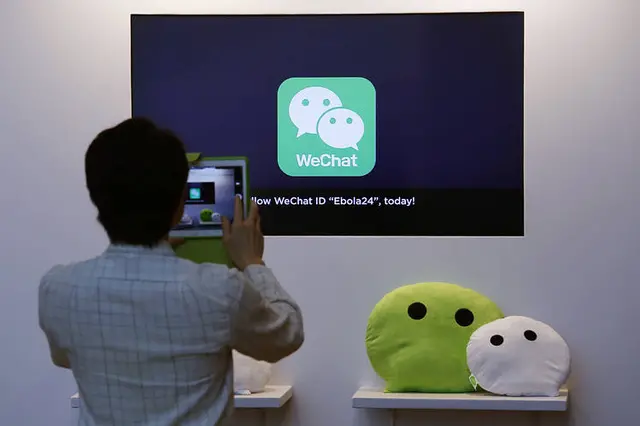The war to control office communications in China began in earnest Monday, whenTencent HoldingsLtd.launched its Qiye Weixin, or Enterprise WeChat, app.
The new app aims to protect the phenomenally successful WeChat franchise, and repel a threat from rivalAlibaba Group HoldingLtd.It also offers to help Chinese separate work from life, a nettlesome problem that WeChat helped to create.
Alibaba is China’s e-commerce king, but has had little success with messaging and social-networking apps. Last year, it tried again with DingTalk, an office-oriented app that it says can “return focus to work.” Lest anyone miss the message, Alibaba last week posted online videos that portray WeChat as a source of distraction, stress and tardiness at work.
The rivalry between the companies is intense. Neither wants to let the other gain an upper hand in an emerging technology that could be a big future market. Business software is a hot arena, as Chinese companies seek efficiencies to offset rising labor costs. For now, both services are free, but analysts believe both Tencent and Alibaba can generate revenue from payment processing and other services. There is some truth in Alibaba’s message. With 697 million monthly active users, WeChat, or Weixin (micromessage in Chinese), plays an important role in both Chinese work and life. Roughly 87% of WeChat users say they check it more than 10 times daily, according to a government survey released this month. In a country where email has never taken hold, WeChat is an important work tool that many companies use for internal and external communications.
That can cause problems. WeChat began in 2010 as an intimate social network. Its rapid growth blurred the line between work and life.
Many Chinese have stopped exchanging business cards and cellphone numbers, preferring to add each other as WeChat friends. Imagine your family members, yourFacebookfriends, your work colleagues and business contacts using Facebook Messenger to conduct simultaneous one-on-one and group chats while commenting on each other’s Facebook news feed.
That is where Alibaba saw an opportunity, with a work-only app. After 15 months, 1.5 million enterprises use DingTalk, some of them from Alibaba’s large network of Taobao merchants and business partners. But some features on DingTalk are so efficiency-driven that it risks being seen more as task master than helpful tool to separate work from life.
DingTalk is used as an internal communications tool at Alibaba, which is famous for its zeal in fast and efficient execution. One feature is called “ding,” or nail. DingTalk allows a sender to see whether a message has been read. If not, the sender can “ding” the recipients with an automated call or text message as a reminder.
“Its goal is, no matter time or location, a boss can always reach a subordinate,” says Wang Xiaofeng, an analyst at Forrester Research’s Beijing office. “It’s a lot of pressure on the employees, while owners of small and medium-sized businesses will find it very useful.”
An Alibaba spokesman says DingTalk aims to help users work more effectively so employees can have more work-free time.
Enterprise WeChat, born of Tencent’s more relaxed culture, tries to differentiate itself from DingTalk as a considerate tool that distinguishes between work and life. For example, employees can post an “off” sign on their profile pages so they won’t receive new messages. In place of “ding,” Enterprise WeChat allows a sender to request a receipt from recipients on important messages.
One controversial feature on both DingTalk and Enterprise WeChat is location-based attendance sign-in.
Employers and managers like it, to help know their employees’ whereabouts. But some employees resent the oversight.
Wang Yandi, chief executive of a local classified information website in Anhui province, says he randomly asks his salespeople to sign in with DingTalk to make sure they’re where they’re supposed to be. Michelle Xie, who works at an Internet company in Shanghai that started using an early version of Enterprise WeChat last week, says the feature is too controlling. “It’s anti-human,” she says.
Both apps must contend with the popularity of WeChat. Feng Shengnan works at a private-equity firm in Beijing and has two cellphones and two WeChat accounts for work and personal use respectively.
The Alibaba spokesman says users can turn off the location service. Tencent declined to comment.
Last winter, her boss asked employees to start using DingTalk. But the switch lasted only two weeks, because employees found that they didn’t use DingTalk very much. “We’re used to checking WeChat all the time, even after work,” Ms. Feng says. “It’s hard to separate work from life.”
For Tan Li, a corporate communications officer at a tech company in Heilongjiang, adding an office communications app only added another stress factor.
“I get nervous whenever somebody sends out a DingTalk group message,” she says. “Everybody’s phone starts ringing at the same time. Then we’ll get the same message in our QQ messenger and various WeChat groups. It’s like carpet bombing.”
(THE WALL STREET JOURNAL)
 简体中文
简体中文

